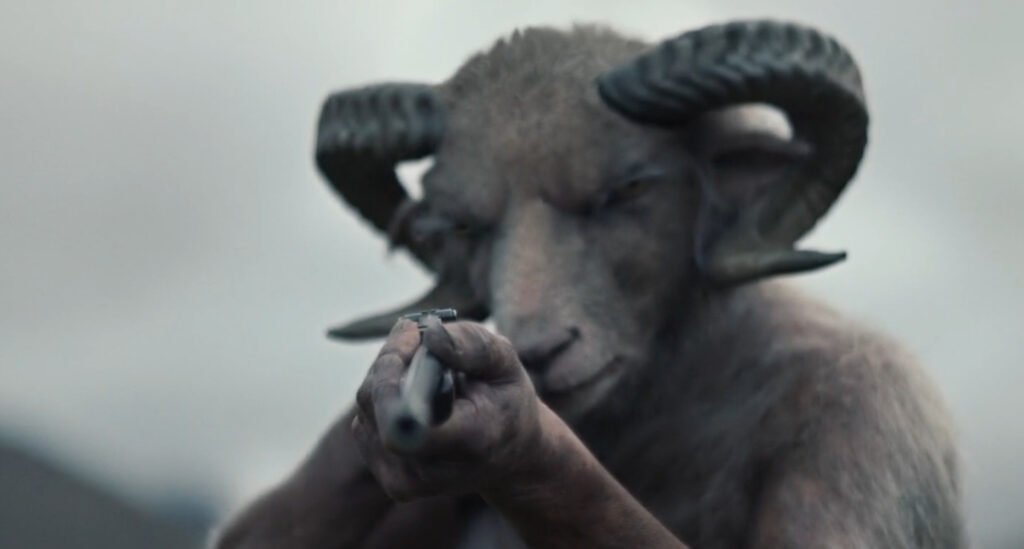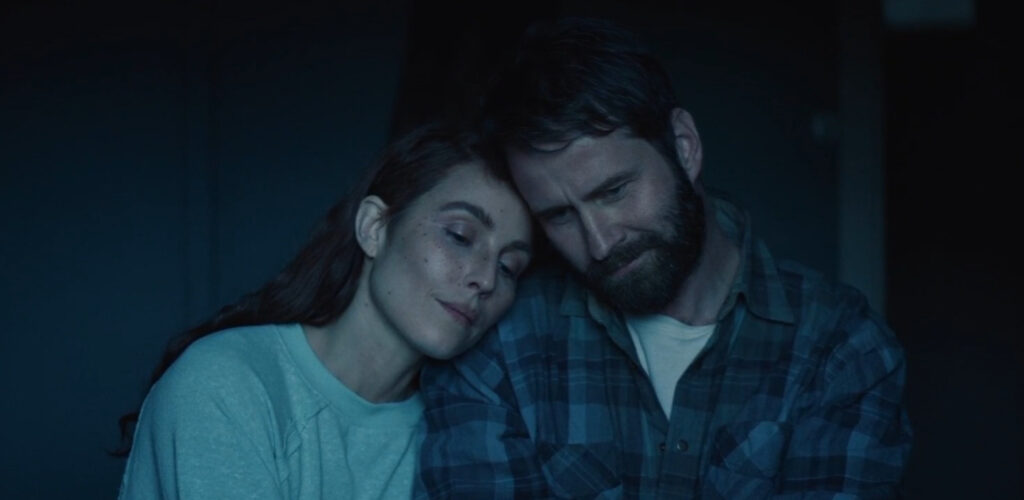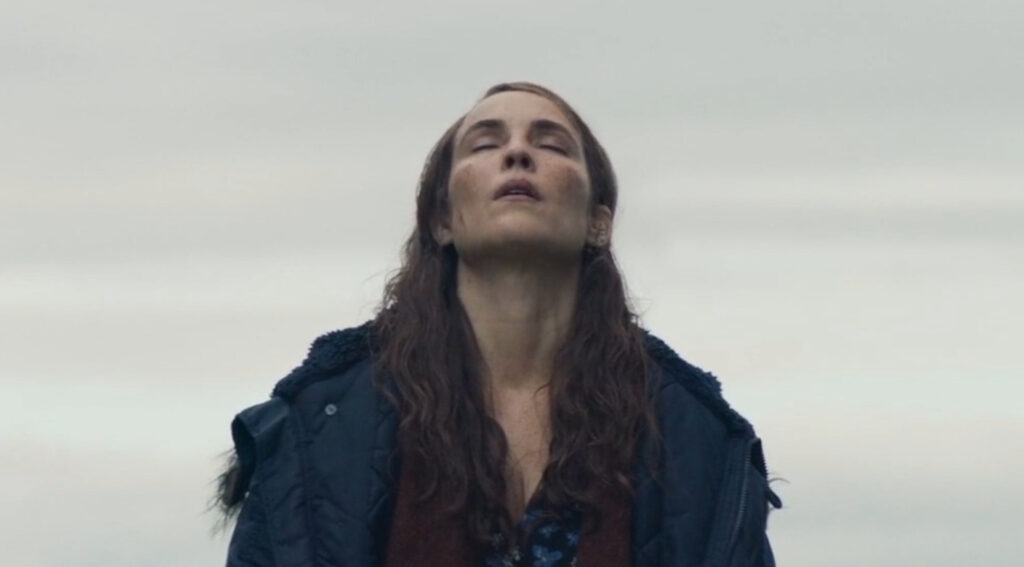Watch Lamb on these streaming service providers:
A24’s Movie Lamb Explained and Investigated. I’ve been dying to watch Lamb for about six months now. The trailer, the buzz, the conversations happening on the indie trade rags? All a tsunami of expectations… and did I mention it was a movie crafted, cultivated and created via A24? A24 in the indie world is magic. Gold plated goodness. First Cow. The Lighthouse. High Life. The Hole in the Ground. Hereditary. First Reformed. Backstabbing for Beginners. The Killing of a Sacred Deer. A Ghost Story. It Comes at Night. And that’s just off the top of my head. (I just had a thought, I know for a fact that there are a pile of A24’s I haven’t written up here on THiNC. – I really should systematically go through them all. Hrmm.) Wait, what are we doing here? Oh, right! Lamb! Holy @#$@ man! What just happened there?!? Let’s talk about this one, because I know that the comments are going to come off the wagon on this one.
Lamb is a movie that sits in a really weird nexus point. I’d tell you other movies like it, but I’m worried it would spoil it. And we cannot have spoilers for this one. Nope. If you haven’t seen the movie yet, click one of the streaming locations at the top of this post, then continue reading. It’d break my heart to find out that I spoiled this movie for even a single movie goer.
So, if you haven’t watched this movie – DO NOT CONTINUE READING.
LAMB SPOILER FILLED WALKTHROUGH
As the movie opens, we watch as we run through the mist, and encounter horses. They flee from whatever it is that is breathing loudly… whatever it is? It’s intimidating. In my notes, I furiously scribbled the following words: “Heaving breathing… a demigod, demon, God Himself visiting earth for vengeance? I’m going with demon. This is a demon that is visiting this corner of the planet, and is about to impregnate a ewe. Why is this demon impregnating a sheep???” Hrmm. We’ll have to revisit these thoughts of mine after only 2 minutes of screen time (well, that and the trailer) later. So put a pin in that, and let’s continue on to Maria and Ingvar, and see if we can’t figure this couple out.
In what seems like one of the most remote locations on the planet – Iceland – Maria and Ingvar are sheep farmers, doing their best to mind their own business, keep things going, and earn an honest buck. (I literally stopped the movie and tried to figure out how sheep farmers make their money. It’s rough math… gotta be a really hard job. Just saying.) Then on Christmas day we listen as the foreboding breathing approaches the barn, and then a sheep comes in and lays down. Hrm. (I have many things to say on this topic.)
There is no dialog for almost the first 10 minutes of the movie. And then when they do talk, Ingvar tells Maria that scientists have theoretically figured out that time travel is possible. And Maria says that if time traveling into the future is possible, then assuredly traveling back in time will be possible. (And that is how you set up a new character with nearly no dialog. Why? Because we now know that something traumatic, bad, or difficult happened to this couple in the past.) Then some time later (takes 5 months for a lamb to be born I do believe) a lamb is born that is half lamb, half human.

The couple doesn’t bat an eyelash. They pick up like this was some sort of obvious divine intervention. God gave them a half lamb baby. Okay. We’ll take care of it, and it will want for nothing. And in the brilliant spirit of the best suspension of belief that movie making can give an audience, they plug on with nary a question or thought to the weirdness of the situation. Soon though, the child goes missing when Ingvar takes his eyes off of her for a second. They find her with her mother, out in a field…
Chapter 2 brings Ingvar’s brother. Pétur arrives at the farm in the trunk of a car. Drunk? His stuff chucked into the field. He obviously does this occasionally to Ingvar and Maria. And he quickly calls the couple out on the weirdness of the child… “What the fuck is this?” – “Happiness” his brother responds. But more importantly, Maria has nightmares about sheep, evil sheep, that are stalking her in her sleep. And when she awakes, she goes out to the field, finds Ada’s mother, and shoots it. She then buries it in the field. As I was watching the movie, I knew that this one act was going to be seminal… but I didn’t know just how seminal it was.
Soon after Pétur arrives, it quickly becomes clear that Maria and Pétur have a past. A relationship of some sort has occurred between them. What is going on here? Maria is clearly cutting Pétur off, but he is assuming a lot here for a guy that is not married to her. Not to mention the fact that this is Ingvar’s brother! Yikes. Maria is certain that Pétur will harm Ada… she even dreams that he takes the child out to a field and shoots the child. The relationship between Ada and Pétur is quite touch and go, swinging wildly, as the audience is left to wonder which direction it will go. One minute he is attempting to feed it grass. The next minute he cuddling with it, as they sleep together.
While Maria, Ingvar, and Pétur watch a football match of some sort, Ada goes out to the field. And we can tell that the demon from the beginning of the film has returned. The heavy breathing. The trudging, all indicate that the being is back. And it kills the family’s dog. Why? What is its purpose? It’s purpose in creating Ada, in stalking the home, in killing the dog? What is happening here? When Ada returns back, Ingvar is drunk, and she cuddles up with him as they sleep together. Meanwhile, Pétur hits on Maria, and Maria locks him in a closet til morning. And the next morning, without consulting Ingvar, Maria takes Pétur to the bus stop, and gives him cash. Sends him on his way. See? She is the morally upright in this film! She has remained true to Ingvar, to Ada… she has protected her new family unit. She is on the straight and narrow. (or not.)
While Maria is out, Ingvar and Ada go looking for the dog… can’t find it. So they head off to work on the tractor. No luck. And as they are heading back towards the house, Ingvar is randomly struck by a bullet in his neck. Ingvar turns to see a Ram/Man being, holding a rifle.

The Ram shoots Ingvar again, takes Ada by the hand, and they walk off together back into the mountains.
Maria, soon after, returns from dropping Pétur at the bus stop. But she immediately knows something is awry. What has happened? Where is Ingvar? Ada? She runs out to the field, finds Ingvar bleeding out, and Ingvar dies. As the movie ends, Maria is beside herself, as she looks around to see what it is that her life becomes. She calms down as the gorgeous mountains and the sun sets behind her. It seems as if resolve is in her face? At which point, the director thought it the best moment to drop the titles on the audience and end the movie.

A24’s Movie Lamb Explained and Investigated
There are many movies that we talk about here in THiNC. that can be unlocked with a single piece of evidence. A moment, a look, a key detail on screen… they unfold the meaning of the movie easily and elegantly, even if the director doesn’t explain it as such directly. But with A24’s the Lamb, this movie is very different from those sorts of movies. You need to be more comfortable holding your questions and your lack of answers closely, and considering what they might mean to you specifically. That doesn’t mean there aren’t answers here… there are. But I would push you to consider what you came away with emotionally when the movie ended.
The first question on the table is “Who is Ada?”
Not the half sheep, half human creature. Her predecessor. Obviously Ingvar and Maria have had a child before (or maybe Maria did with Pétur??). I did a little bit of research and in Iceland, family surnames work differently there. Icelanders create their last names from their father or mother’s first name. So, in Iceland, the last name is made from their father or mother’s name, followed by the word son or daughter. Why does this matter? Well, I noticed on the cross, the name of the dead child was “Ada Ingvarsdóttir” and I immediately recognized Ingvar’s name in her last name. And dottir wasn’t too hard to equate back to daughter. Ada might still have been Pétur’s daughter, but maybe Maria and Pétur didn’t tell him? Hrmm.
Regardless… it obviously it ended in grief. The only indication that Ada even existed was her grave marker that sits on the property in the family cemetery. Was it a child lost in childbirth? The marker hints that she was an angel… maybe she lived past child birth and died on the farm? There is a scrap of dialog that gives us an indication that this year is better than last year. And that year was better than the year before. So did Ada die 2 or maybe 3 years ago? Their loss is recent anyway. Recent enough for Pétur to understand what is happening here.
The second question on the table is “Who is Ada?”
No, not the dead child in the cemetery, the half child, half sheep creature. What is she? Well, on the face of it, Ada is the product of a half man, half ram creature, that has mated with a sheep on the family farm. Taken on the face of it. That is exactly who she is. Non-metaphorically… very literally, she is the product of a mythical creature. But to Maria, Ada is obviously something entirely different than that. Having lost a child in the past several years, Maria immediately saw that the child was a “blessing” from God, took it as such, and took the child as her own. And immediately, what has happened here, is that we have a collision between this new mythical world, and reality.
My next question is about the relationship between Pétur/Ingvar & Maria
Take Ada the half sheep off the table, and we still have a pretty weird story happening here. Ingvar and Maria are grieving parents trying to figure out what this world looks like without their child, Ada, who died a few years prior. But then, when Pétur shows up at the house, looking for help? Things get even weirder. It’s really clear that Maria and Pétur have had a relationship of some kind. Ingvar is PROBABLY clueless that this has happened. But it’s so thick between Maria and Pétur that they obviously have had an affair. It’s just really weird how clueless Ingvar is with everything. It’s so weird I wonder if Ada1 was Pétur’s?
Is this a Mythical World? Or Reality?
This is the most important question to me, above any other conceivable question. The movie plays this really weird conceit in a straight fashion the entire movie long. The only moment where the question is called is when Pétur asks what the F@#$ is going on. But otherwise, the couple just happily accept Ada2 as their new daughter. But this could be because of their deep seated grieving that they are still doing. I mean, if we got on that bus, and went to town, would the city be filled with half men, and half sheep? I mean… WHAT IS GOING ON HERE? Is this the first time humankind has noticed this sort of creature exists? OR IS IT A PARABLE? A MYTH? What the hell is going on here? We get zero help from the director and the actors. Pétur’s reaction to Ada seems to indicate that we are in the real world. And that this Ada thing is as you would expect it to be… really weird.
A Christmas Lamb?? I mean… COME ON
I have watched this section of the movie over and over and over again, as I have attempted to figure out literally what happened here. I think I have it right… but don’t hesitate to correct me in the comments.
On Christmas day, our Ram/Man visits Ingvar and Maria’s sheep farm. And he impregnates a sheep. And that spring (lambs gestate for 5 months I believe) Ada is born. I assumed that the sheep was about to give birth on Christmas day, but that isn’t how it happened. At least I don’t believe. It would be interesting if it had, because it would be a more clean Christ metaphor for us to delve into. But even so! What is the point of calling out Christmas day in the middle of this strange mythical story? What purpose does it achieve?
In the Judeo-Christian world view, a lamb that was used to atone for sins in the Old Testament, and is a symbol for the Christ coming to take away our sins for good. Right? So if you drop a lamb into this story on Christmas day you have to wonder if it is hinting at some sort of sin/grace/judgement/forgiveness sort of idea that is happening here. Or is it talking about a bastardizing of this idea? Hrm.

Has Maria sinned?
Seems like a stupid question – but I think it’s important. Before the shock reveal of the Ram/Man, we watch as Maria stays true to her husband. She stays true to her new child. She holds on to this life of theirs, and refuses to let go… she protects the farm, their sheep, their marriage, all of it. She could have easily have jumped ship and slept with Pétur while Ingvar was crashed out with Ada. But instead she locks him in a room and takes him to the bus stop the next day. It was PERFECT. She has not sinned. She’s remained true.
But the funny thing is? This movie wasn’t concerned at all about her possible infidelities with Pétur. She has committed a totally different infidelity she isn’t even aware of. Ada’s mother… no, not Maria, but rather the sheep that gave birth to her, is constantly trying to get to her lamb. Over and over again, the ewe is constantly coming over to the house… trying to get to Ada. Now, knowing what we know. The ram/man, has born a child of the ewe mother… and Ada is the result. Okay. What does Maria do though? She walks out to meet the ewe/mother in the field… the one that is looking for its child… and shoots her in the head, and then buries her.
Now, I ask you… has Maria sinned?
So, yes. The answer is a definitive yes. But if that is the case, why doesn’t ram-man kill Maria instead? Well, maybe he will. But I would also argue that in ancient cultures, men – specifically husbands – were held responsible for their wife’s actions. And this is what is happening here. Ingvar has been murdered, in exchange for the murder that Maria committed to the ewe. With that? The slate is clean. Maria has paid for her evil with the life of her husband.
Thoughts on the Ending of Lamb
I’ll be honest, I laughed out loud when I found out who the demon was. And yet, I was also crushed by the knowledge simultaneously. We realize that the quiet repose, and the attempts by Maria and Ingvar to create a safe haven for themselves has been completely shattered. This movie has stayed with me the past 24 hours, and I can’t stop thinking about it. It’s rattled me a bit even. Can’t quite explain it.
Since finishing up the writing of this post, I have started scouring the interwebs, in order to see what the director and Noomi are saying about the film. And it would seem that there is no Icelandic myth that the story is based on. Valdimar Jóhannsson, the writer and director for the movie, has said that he grew up on a sheep farm, and it has stayed with him. Hrm. Okay. But I’ve also heard Noomi say that the movie ends with a positive, the world is open idea to it. She is unchained from her past, and is free now to go create something new. Wait, what? Or worse, I’ve heard some from the production crew say that you should find joy where you can, and not let it go… appreciate what you have in the moment that you have it. That’s like me saying that your child makes me happy, so I should take your child, and enjoy them while I can… right up until I’m taken to prison. (The Kindergarten Teacher anyone?) Makes zero sense whatsoever. Unless you look at the ram man and ewe, and Ada as some sort of extension of mother nature that sort of gives and takes away? Yeah… no.
I personally see this as a story of a family that has grieved the death of their child, and have gone to unnatural lengths to recreate those joys. They have stolen and killed, and it has left a hole elsewhere. And eventually, that hole has responded because nature abhors a vacuum. And that Maria has gotten what she deserves.
… better yet, I still think Ram/Man will still come for his real revenge.
Edited by: CY



